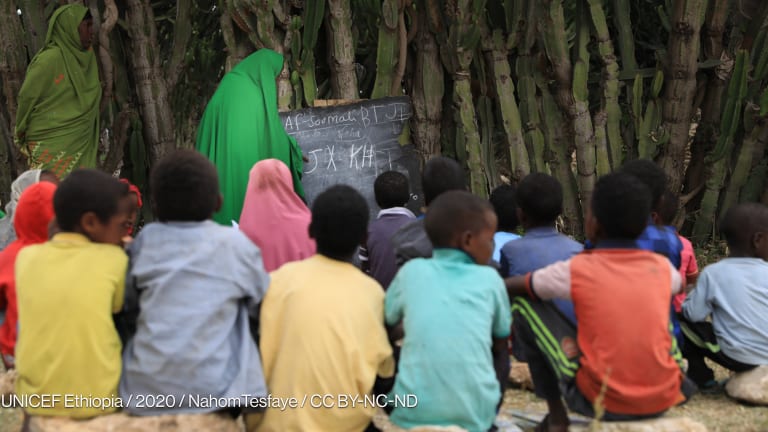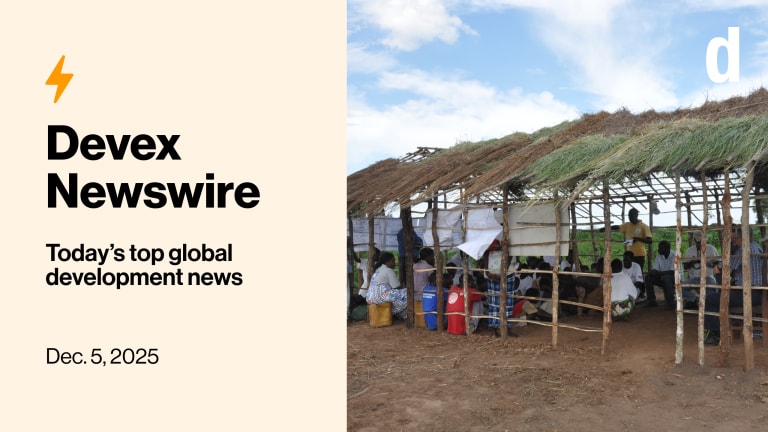
As the United States looks set to implement hefty aid cuts and drastically reorganize the way it does foreign assistance, European development experts express mixed views on the likelihood of their countries picking up the slack caused by U.S. disengagement.
While one European leader said she was confident European Union member states would step up to fill any funding gaps left by the U.S., others were less positive. They painted a picture of EU funds in decline and of lack of coordination among donors during a roundtable discussion called Into the Breach, hosted by AidData, a research lab at the College of William & Mary, held in Washington, D.C.
The discussion comes as the development community braces itself for a 30.8 percent cut to the U.S. foreign aid budget under President Donald Trump, first outlined in the so-called “skinny” budget released last month. But a State Department budget document leaked on Monday offered more detail, including proposals to close up to 40 U.S. Agency for International Development missions, lay off about 20 percent of staff, and potentially merge the agency into the State Department, as Devex reported earlier this week.
As the world’s largest aid donor — spending $54.6 billion in the fiscal year 2016 — a 30.8 percent budget reduction would be felt around the development world. However, former head of evaluation at the Danish Ministry of Foreign Affairs, Susan Ulbaek, was relatively unfazed by the prospect.
“I really hope the U.S. will be out there big and strong with all their good ideas and fantastic people but the world will continue, and you’ll be back again,” she said.
Ulbaek, who is also an executive director on the board of the World Bank, said she was confident that EU member countries would step up their foreign aid efforts to meet the shortfall and pointed to the She Decides fund, founded initially by the Netherlands, Denmark and Sweden in response to the reinstatement of the global gag rule by U.S. President Donald Trump, as evidence to show this is already happening.
“I think the European Union will know that this is our time now and I have great expectations for a new German-French axis that is going to come out and drive EU development reform,” she said, pointing specifically to increased activity in the Africa and the Middle East.
Two other development experts were less optimistic, however. Dr. Stefan Leiderer, head of the department of governance and official development cooperation, at the German Institute for Development Evaluation referred to a trend of “backsliding” among European donors. Leiderer said some countries were no longer observing the principles agreed under the 2005 Paris Declaration on Aid Effectiveness around country-ownership of development plans, alignment between donors and developing countries, harmonization between donors, mutual accountability and a focus on results.
“We observe that … almost all coordination platforms for donors, government and civil society have disappeared … and we observe a broad “bilateralization” of development cooperation, whereby each donor negotiates their own projects and programmes directly with government and neither government nor donors have a clear overview of projects and funds going into each sector,” Leiderer said.
This way of doing development is reminiscent of the 1980s and 1990s, and is especially prevalent in sub-Saharan African countries, he said.
European donors are stretched, and struggling to cope with a migration crisis, mostly triggered by the Syrian civil war, which is resulting in the diversion of overseas development assistance resources, as well as the implications of the U.K.’s exit from the EU post-Brexit. These factors means Europe is not in a position to step in and fill any foreign aid funding gaps left by the U.S., according to Jonathan Katz, a fellow at The German Marshall Fund of the United States, or GMF, which produces research and analysis on transatlantic issues.
“Now is not an opportune time for the U.S. to being falling back. I don’t believe Germany and others will fill the gap, the resources are not there and they are being reduced,” he said.
As Devex reported in February, German official development assistance is going up, increasing by 26 percent in 2015 to $17.8 billion, making it the third largest donor for ODA after the U.S. and the U.K, that year. In 2016, it was the second largest aid donor, according to OECD data.
The GMF fellow also raised concerns about the way the U.S. budget cuts were being handled, and warned that shutting down between 30 and 40 USAID missions could create situations similar to what was seen in Montenegro under the last U.S. administration, when the mission was closed only to be reopened a year later.
“The U.S. leaving [countries] and missions is problematic and it’s not easy to restart these things … I’m really concerned about those people feeling like they can take an axe to USAID or just shove it into State Department, and think you’re going to get the results that you want,” he said.
Read more international development news online, and subscribe to The Development Newswire to receive the latest from the world’s leading donors and decision-makers — emailed to you free every business day.
Read more coverage on foreign aid under the Trump administration
▶ Steep US foreign aid cuts outlined in leaked budget document
▶ As budget negotiations begin, here's where US Congress stands on foreign aid
▶ Budget cuts target development assistance, hint at organizational change
▶ Digging deep: How Trump's budget affects everything from local jobs to foreign stability








